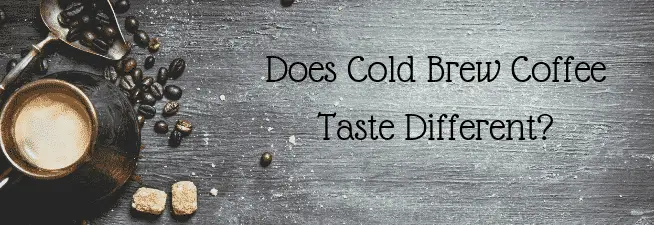
The taste of coffee itself, whether it is regular or cold brew, is subjective and highly personal to each individual. There is, though, a general consensus about what constitutes good or bad tasting coffee.
Bad tasting coffee will be watery, overly bitter, or utterly tasteless.
Good tasting coffee, on the other hand, will provide a rich flavor which some may describe as earthy.
Delicious coffee will be versatile and flexible, providing the perfect background taste to whatever creamer or sweetener is added.
In fact we have a full article devoted to what good coffee actually tastes like.
The Cold Brew Difference
What often sets cold brew coffee apart from other types of traditional coffee is the way that it is made. It never comes in contact with warm or hot water, but is instead made with room temperature or cooler water.
The coffee is soaked in water similar to the way that a large tea pod may be steeped to make tasty loose leaf tea. Cold brew coffee is concentrated in a way that regular coffee is not, and because of how it’s produced, cold brew is less acidic.
The lack of acidity means that it can be easier on both the teeth and the stomach, which makes it the perfect choice for those whose bodies are sensitive to coffee.
This absence of acidity contributes to a difference in taste between regular coffee and cold brew coffee.
Cold brew coffee is also significantly sweeter than traditional coffee, which many people enjoy because it means that they do not need to add as much sugar (or other method of sweetener) to achieve the sweet taste that they may prefer to have with coffee.
Is Cold Brew Coffee Sweet?
Cold brew coffee brings out a different set of flavors from the coffee bean than its cousin hot brew. Unlike the cup of coffee most are used to waking up and brewing impatiently, cold brew gets started at least 12 hours before you can drink it.
Using cold water and typically double the amount of coffee grounds, it can take up to 24 hours to brew coffee in this manner.
For many the benefits can be worth it as you can count on a consistent cup of coffee that you can make ahead for the week. Cold brew stays in the fridge for up to two weeks, though you may need to begin diluting after the first week.
Cold brewing draws out the flavors of your beans without heat, leaving behind many of the more bitter, sour and acidic notes that make coffee what most people know it to be.
The coffee you get from cold brew will be milder than a hot brew. You will find the acidity to be significantly lowered in a cold brew. The sweeter flavors and fruity notes of the coffee can become more prominent when bitterness and acidity are left behind.
If you add sweetener to your coffee, you may think cold brew is sweeter because you use less sugar.
This may be because hot coffee is significantly more aromatic than cold coffee. The hot coffee activates your sense of smell as well as more flavors on your taste buds, allowing sugar to take a backseat. Without the aromatics and bitter acidity of hot coffee, sweetness can quickly become the dominant flavor over others, leading drinkers of cold brew to believe the coffee itself is sweeter.
The same sweetness exists in hot brewed coffee if brewed correctly, but it can be easily overpowered by these aromatics and strong bitter flavors. You may find as your coffee cools that it begins to taste sweeter and you notice the distinctly coffee flavor less.
Cold brew coffee contains no additional sugar to a hot brewed coffee, but due to the method of brewing sweetness is one of the flavors that come to the front.
Should You Dilute Cold Brew Coffee Before Drinking It?
Cold brew coffee should be prepared with cold water and twice the amount of coffee grounds you would normally use. It should be allowed to brew for 12 to 24 hours in the fridge and then the grounds should be removed.
This cold brewed coffee can keep in your fridge for up to 2 weeks if you don’t dilute it from this stage.
Here’s more info on our site on the shelf life of cold brew coffee.
Day after day, you can count on the same cup of coffee without significant flavor change in the same way a hot coffee suffers.
After about a week in your fridge the coffee will start to concentrate, whether you’ve made a concentrate or not, you may wish to begin diluting at this point.
You should definitely dilute your cold brew coffee to whatever level you enjoy using water, milk, cream or a combination of the above.
The trick is that you should not dilute your master batch of cold brew. When you dilute your cold brew, you bring the shelf life down from two weeks to just two or three days. Yikes!
Your master batch of concentrate or cold brew should not be diluted until there are only a couple of days of coffee remaining.
How to Dilute Your Cold Brew?
The key to finding your perfect cup of cold brew is to get a grasp on the ratios.
First, you have a ratio of ground coffee to water to make your concentrated batch.
Then you need to find the ratio of water to your concentrated batch to find your perfect mix.
Making Cold Brew Dilutions
1 part coffee grounds:5 parts cold water – This will make your concentrated cold brew.
1 part concentrated cold brew:3-4 parts cold water – This makes your perfect cup of cold brew.
You may wish to experiment using milk or cream as a replacement for some of the water.
Concentrating with Time
If you store your cold brew in the fridge for over a week, you may find it begins to get a little stronger and requires a slight adjustment in your ratio. Or if you weren’t diluting, you might want to start!
The Taste of Cold Brew Grows on You!
If one asks for the coffee order of ten different people, one will be sure to have ten different orders and preferences. Coffee is treasured and enjoyed by millions and millions of people all across the world.
The love of coffee tastes and preferences could be considered to be on a spectrum, from love of rich, black and bold to incredibly mild, sugary or sweet.
No matter your taste preferences, cold brew has something to offer each person.
Cold brew with nothing added to it has a smooth and luscious flavor. After adding creamer, milk or sweeteners in, the flavor of the cold brew coffee will be enhanced and even more enjoyable to most.
Cold brew also lasts longer than traditional coffee, so if you stick it in the fridge, it will maintain taste and flavor for days afterwards. This can appeal to individuals who may like smaller portions of coffee (sipping here and there) or would be interested in saving money by buying less.
If making one’s own cold brew, it could also reduce time spent on making coffee by making large batches at once and storing them in the fridge.
See this post for more on making coffee in advance.
In fact, cold brew can also be frozen, so any leftover could be made into coffee ice cubes and kept for up to six months.
The flexibility of cold brew is gratifying for all coffee consumers and often surprises those that know little about it.
